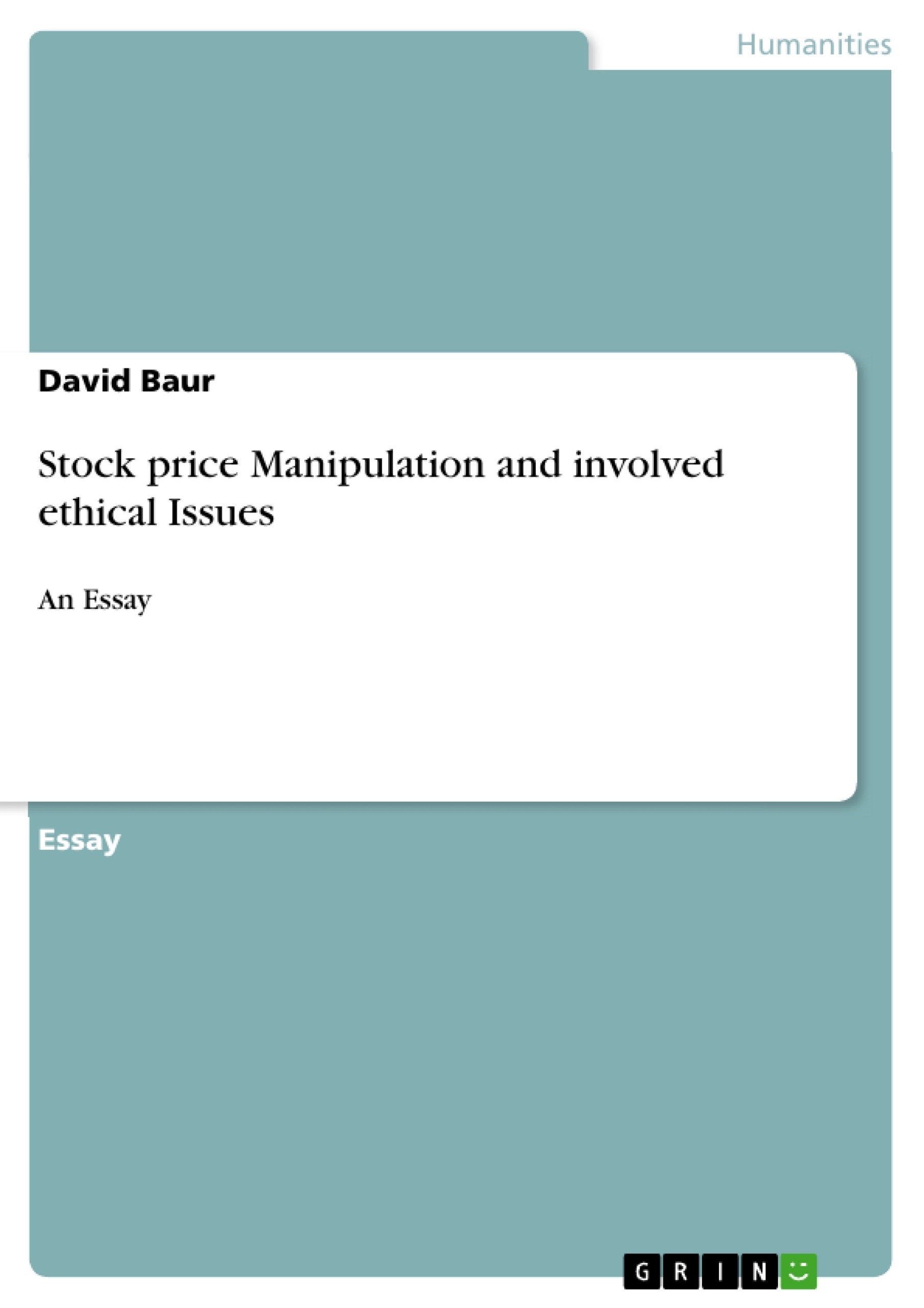This essay aims to answer the question how fraudulent trading activities at the stock markets, such as stock price manipulation due to pump and dump schemes, could be prevented. This is especially considered under an ethical point of view. The paper includes a case study about stock price manipulation at the well-known investment banking firm Stratton Oakmont. The case study is used to relate the consequences and involved ethical issues using a real-life example. The analysis is mainly based on screening external newspapers, internet articles and books which concern related topics, such as business ethics and stock market manipulation.
Inhaltsverzeichnis (Table of Contents)
- Abstract
- Index of abbreviations
- Introduction
- Stock exchange and Stock pricing
- The legal situation of stock manipulation
- Pump and Dump strategy
- Methodology
- Case Study
- Ethical issues
Zielsetzung und Themenschwerpunkte (Objectives and Key Themes)
This essay aims to investigate how fraudulent trading activities at the stock markets, specifically stock price manipulation through pump and dump schemes, could be prevented, particularly from an ethical perspective. The paper examines a case study involving stock price manipulation at the investment banking firm Stratton Oakmont to illustrate the consequences and ethical implications using a real-life example. The analysis draws primarily from external sources including newspapers, internet articles, and books related to business ethics and stock market manipulation.
- The mechanisms of stock price manipulation and its impact on the stock market.
- The legal framework and regulations governing stock market manipulation.
- The ethical implications of stock manipulation, including the conflict between self-interest and customer interests.
- Ethical theories and their potential application to prevent fraudulent activities in the stock market.
- The relationship between ethical behaviour and profit maximization in the stock market.
Zusammenfassung der Kapitel (Chapter Summaries)
- The introductory chapter provides background information on the stock market, its function, and how stock prices are determined. It explores the impact of supply and demand dynamics, macroeconomic indicators, and other factors on stock prices.
- The chapter on the legal situation outlines the regulations in place to prevent stock market manipulation, specifically in the German context. It explores the provisions of the Securities Trading Act (WPHG) regarding deceptive practices that could influence stock prices.
- The chapter on the Pump and Dump Strategy explains this common technique used by market manipulators to inflate stock prices artificially and then sell their shares at inflated prices, leaving other investors with losses.
- The methodology chapter describes the approach taken in the essay, focusing on the case study method to analyze the ethical implications of stock manipulation.
- The case study chapter presents the Stratton Oakmont case, highlighting the firm's fraudulent practices involving pump and dump schemes and their consequences on customers.
- The chapter on ethical issues delves into the ethical dilemmas surrounding stock manipulation, particularly the conflict between maximizing profits and ethical conduct. It explores ethical theories and their potential applicability to address such conflicts.
Schlüsselwörter (Keywords)
This essay explores the ethical implications of stock market manipulation, specifically focusing on pump and dump schemes. It examines legal regulations, analyzes a case study involving Stratton Oakmont, and discusses ethical theories and their application in the context of the stock market. Key terms and concepts include stock price manipulation, pump and dump strategy, ethical theories, profit maximization, and the conflict between self-interest and customer interests.
Frequently Asked Questions
What is the primary focus of this essay on stock manipulation?
The essay investigates how fraudulent trading activities, specifically pump and dump schemes, can be prevented from an ethical and legal perspective.
What real-life example is used to illustrate stock manipulation?
The paper features a case study of the investment banking firm Stratton Oakmont to show the consequences and ethical issues of fraudulent practices.
What is a "Pump and Dump" strategy?
It is a technique where manipulators artificially inflate stock prices (pump) and then sell their shares at the peak (dump), leaving other investors with significant losses.
How does the legal framework address stock manipulation in Germany?
The essay outlines regulations such as the Securities Trading Act (WPHG), which prohibits deceptive practices intended to influence stock market prices.
What ethical dilemmas are discussed in the context of the stock market?
The main ethical conflict discussed is the tension between profit maximization/self-interest and the interests and protection of customers.
- Arbeit zitieren
- David Baur (Autor:in), 2017, Stock price Manipulation and involved ethical Issues, München, GRIN Verlag, https://www.grin.com/document/988695



